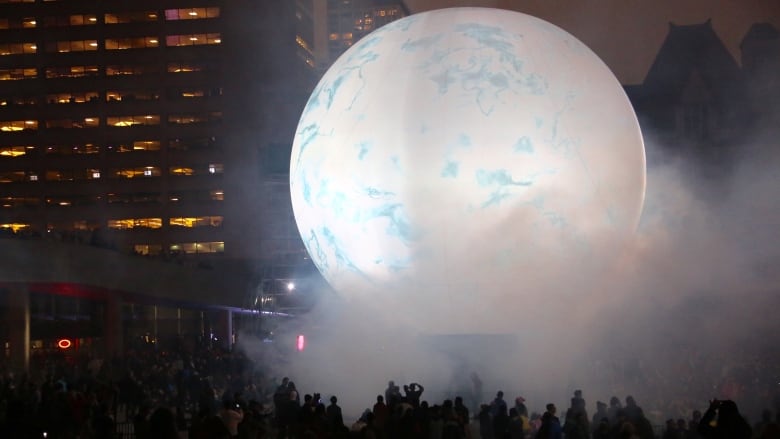A smaller Nuit Blanche transforms parts of Toronto into urban art gallery
Celebration of contemporary art was held without its title sponsor for 1st time in 9 years

A smaller Nuit Blanche drew hundreds of people to Toronto streets overnight as the all-night celebration of contemporary art transformed parts of the city into a kind of urban art gallery.
The event, now in its 11th year, featured the work of more than 300 artists. It was the first time in nine years that the event was held without its title sponsor, Scotiabank.

Justine Palinska, an official with the city's economic development and culture division, said the event was a success.
"Last night and into the early hours of Sunday, residents and visitors alike embarked on an all-night exploration of art throughout the city for the 11th edition of Nuit Blanche Toronto," she said in a news release.
"Audiences were exposed to a full sensory experience of nearly 90 contemporary art projects ranging from sculpture and performance art to interactive installations and mixed-media, and beyond."
Toronto police reported a stabbing during the event. A teenage boy was taken to a trauma centre in life-threatening condition and is in surgery.
Big crowds and some interesting pieces but I miss the overwhelming "art everywhere you look" feeling of the old <a href="https://twitter.com/hashtag/NuitBlanche?src=hash">#NuitBlanche</a>. <a href="https://t.co/u6GWYQ5zdh">pic.twitter.com/u6GWYQ5zdh</a>
—@mattgallowaycbcAbout 50 of the projects were contributed by individual members of the city's arts communities, while the remaining 33 projects were coordinated by the city.
A sampling of art from Nuit Blanche
This orb, some 14 metres in diameter, was suspended above Nathan Phillips Square outside city hall and designed by Director X (Julien Christian Lutz). It asked audiences to consider what the sun's demise would look like if people were around to witness it.

Fliora Sigismondi's installation projected images onto a wall of water to bring them to life.

"100 Plastic Containers for Human Corpses," by artist Santiago Sierra, consisted of a flatbed truck stacked with grave liner boxes used to preserve the contents of a coffin.

"The Museum of Broken Watches" featured 720 watches, each stopped at a different minute. Together, they displayed all the possible hour and minute combinations of a complete 12-hour clock.

Contemporary Polish-born artist Tim White-Sobieski's installation, "Meet Me in the Glass House," at the Metro Hall Plaza, explored the world of human memory with images projected in flashes onto multiple screens.

American artist Bruce Nauman's piece "Slow Angle Walk" featured a series of repetitive and toilsome body movements, inspired by the characters of Irish playwright Samuel Beckett.

Nauman's video installation was displayed alongside Illinois-born artist David Hammons' "Phat Free," which explored the reality of daily life on New York City streets.

Daniel Canogar's "Asalto Toronto" featured projections of people climbing Union Station to explore the idea of overcoming obstacles. Participants crawled on a green-screen and the image was cast onto the building's facade.
